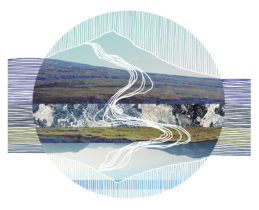|
AUTRES INFORMATIONS À VENIR Avec Claudia Maltais Thériault et Shan Dak Puana Chapitre de livre (réédition 2021) in Kasalokada ta lagwosada. Réalités et enjeux de la recherche collaborative en milieux autochtones, Collectif sous la direction de Carole Delamour, Jo Anni Joncas, David Bernard, Benoit Éthier et Francesca Croce, Éditions Peisaj collection E.Cogito, 2021, 272 p. (ajouter lien vers le livre et vers le travaux) Article (publication originale en 2018) in Dossier thématique – Concrete Ways to Decolonize Research, ACME: An International Journal for Critical Geographies, 17(3), 2018, 687-719. Communication (2014) Dans le cadre du 3e séminaire sur l’éthique de la recherche avec les Peuples autochtones : Des exemples concrets pour décoloniser la recherche, Pavillon des Premiers-Peuples, Campus de Val-d’Or, Université du Québec en Abitibi-Témiscamingue (UQAT), 24 septembre 2014.
CRÉDIT: illustration de la page couverture du Dossier, Lianne Marie Leda Charlie. « tu | drop of water ». Tu is Northern Tutchone and means drop of water.
Themed Section – Concrete Ways to Decolonize Research, ACME (2018) Hugo Asselin et Suzy Basile, Présentation (extrait) du dossier thématique Concrete Ways to Decolonize Research |
À l’écoute de Mishtameku: Éthique collaborative et évaluation de la recherche en milieux autochtones Réflexion sur une expérience terrain / Heeding the Voice of Mishtameku: Collaborative Ethics and the Evaluation of Recherche in Aboriginal Contexts
Résumé
L’un des principaux enjeux d’une démarche d’évaluation de la recherche tout comme de l’éthique collaborative est lié à la négociation du pouvoir. À l’écoute de Mishtamekͧ propose le récit d’une expérience terrain qui a consisté à mettre en œuvre une éthique collaborative commune au sein d’une équipe que nous avons formée aux fins de l’évaluation de certaines activités d’une programmation de recherche. Dans ce contexte, notre équipe a aussi expérimenté un processus d’évaluation collaborative en territoires innu et atikamekw. Ce récit de terrain s’accompagne d’une réflexion souhaitant contribuer à dégager quelques-uns des enjeux et défis propres à l’éthique collaborative dans le contexte d’une démarche d’évaluation de la recherche en milieux autochtones. Cette expérience nous aura permis de prendre encore plus conscience de la part d’évaluation impliquée dans l’éthique collaborative et du potentiel d’une entente de collaboration comme outil d’évaluation en recherche. Par une approche visant à créer des conditions propices à la réalisation d’un bilan évaluatif à plusieurs voix qui soit bénéfique pour l’ensemble des acteurs, est-il possible de rééquilibrer la balance du pouvoir?
————————————–
One of the main issues facing the evaluation of research—as well as collaborative ethics—involves the negotiation of power. Heeding the Voice of Mishtamekͧ describes our field experience, which consisted of implementing shared collaborative ethics in a team we formed to evaluate certain research activities. In this context, our team also experimented with a collaborative evaluation process in Innu and Atikamekw territory. This field experience story is complemented by our reflection on the manner in which some of the issues and challenges specific to collaborative ethics in the evaluation of research in Aboriginal contexts may be identified. This experience allowed us to gain more insight into the role of evaluation in collaborative ethics and the potential of a collaboration agreement as a research evaluation tool. Through an approach aimed at creating conditions favourable to the realization of a multi-voice evaluation process equitable to every actor, is it possible to rebalancing the scales of power?
